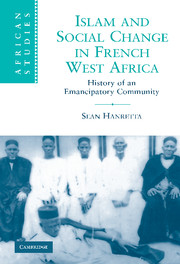Book contents
- Frontmatter
- Contents
- List of maps and figures
- Acknowledgments
- Note on orthographic conventions
- Abbreviations used in references
- Introduction
- Part One “The Suffering of Our Father”: Story and Context
- Part Two “I Will Prove to You That What I Say Is True”: Knowledge and Colonial Rule
- 4 Ghosts and the Grain of the Archives
- 5 History in the Zâwiya: Redemptive Traditions
- Part Three “What Did He Give You?”: Interpretation
- Conclusions
- Glossary
- Note on References
- Index
- Books in This Series
5 - History in the Zâwiya: Redemptive Traditions
Published online by Cambridge University Press: 15 December 2009
- Frontmatter
- Contents
- List of maps and figures
- Acknowledgments
- Note on orthographic conventions
- Abbreviations used in references
- Introduction
- Part One “The Suffering of Our Father”: Story and Context
- Part Two “I Will Prove to You That What I Say Is True”: Knowledge and Colonial Rule
- 4 Ghosts and the Grain of the Archives
- 5 History in the Zâwiya: Redemptive Traditions
- Part Three “What Did He Give You?”: Interpretation
- Conclusions
- Glossary
- Note on References
- Index
- Books in This Series
Summary
outside observers have generally known yacouba sylla and his followers either for the violence in Kaédi in 1930 or for their success as merchants in Côte d'Ivoire, and have sought to explain the community with reference to those local contexts. Opponents within the Hamawiyya and the Tijaniyya have viewed the entire trajectory of the community as the inevitable consequence of Yacouba's own personal character flaws, particularly his ambitiousness and lack of formal religious training. The community's Ivoirian neighbors tended to assimilate Yacouba and his followers to the stereotypical categories of the acquisitive, spiritually powerful marabout and his devoted, materialistic disciples. When Yacoubists themselves explain their past, they too generally present it as a unified tale. For most, the development of their community represents the culmination of a set of transformations in African social life begun decades – if not centuries – before the advent of the colonial state. In particular, they see in their past the unfolding of a series of spiritual gifts that Shaykh Hamallah imparted to Yacouba Sylla and which he in turn had received from Ahmad al-Tijani and, through Tijani, ultimately from the Prophet Muhammad himself. The most important of these gifts was the community itself, its solidarity, and success in the face of indignity, suffering, and the inevitable selfish desires of individual members.
This “unity of action” was not, for most Yacoubists, a consequence of applying a reductive framework to limited information. It was a hard-won truth and a vantage that had to be constructed and actively maintained.
- Type
- Chapter
- Information
- Islam and Social Change in French West AfricaHistory of an Emancipatory Community, pp. 159 - 186Publisher: Cambridge University PressPrint publication year: 2009

